Physical Address
304 North Cardinal St.
Dorchester Center, MA 02124
Physical Address
304 North Cardinal St.
Dorchester Center, MA 02124

Unlock the secrets to stress-free camping without expensive gear or survival skills—discover what seasoned campers wish they'd known before their first trip.
You’ve probably dreamed of escaping to the wilderness, but the thought of camping might feel overwhelming if you’ve never pitched a tent or built a campfire before. Here’s the truth: camping doesn’t require you to be a survival expert or own expensive gear. With some basic knowledge and simple preparation, you can confidently head into nature and create those memorable outdoor experiences you’ve been craving. Let’s start with what really matters for your first adventure.
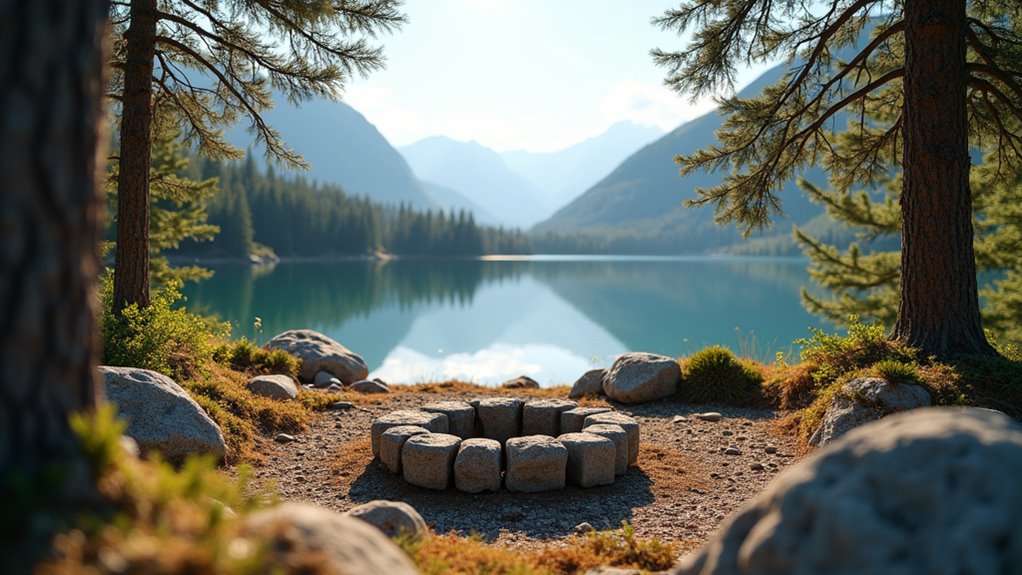
When you’re planning your first camping adventure, selecting the right campsite can make the difference between a memorable experience and a challenging ordeal. Start by choosing established campgrounds with amenities like restrooms, potable water, and fire rings. These facilities reduce stress and help you focus on enjoying nature.
The right campsite transforms your first outdoor adventure from potential disaster into an unforgettable experience worth repeating.
Look for level ground that’s naturally sheltered from wind but still receives morning sunlight. Avoid low-lying areas where water collects during rain, and stay away from dead trees that could fall.
Check if you’re near a water source, but don’t camp directly beside streams or lakes due to wildlife activity.
Research campground reviews online and call ahead to understand rules, availability, and local conditions. Book reservations early, especially during peak seasons. Just as you would carefully review coverage options when selecting travel insurance, take time to thoroughly evaluate each campground’s features and policies before making your final decision.
Once you’ve secured your perfect campsite, you’ll need the right gear to turn that outdoor space into a comfortable temporary home. Start with shelter essentials: a quality tent that’s easy to set up, a sleeping bag rated for expected temperatures, and a sleeping pad for insulation and comfort.
Don’t forget practical necessities like a reliable flashlight or headlamp with extra batteries, a first aid kit, and weather-appropriate clothing layers.
You’ll need cooking gear too—a portable camp stove, lightweight cookware, and plenty of water or purification tablets.
Pack a multi-tool, rope, and trash bags for campsite maintenance. Most importantly, bring matches in waterproof containers and a backup fire starter.
When selecting your tent, consider factors like weather resistance, capacity, and ease of setup to ensure it meets your specific camping needs.
This foundation will keep you safe, fed, and comfortable during your first camping adventure.
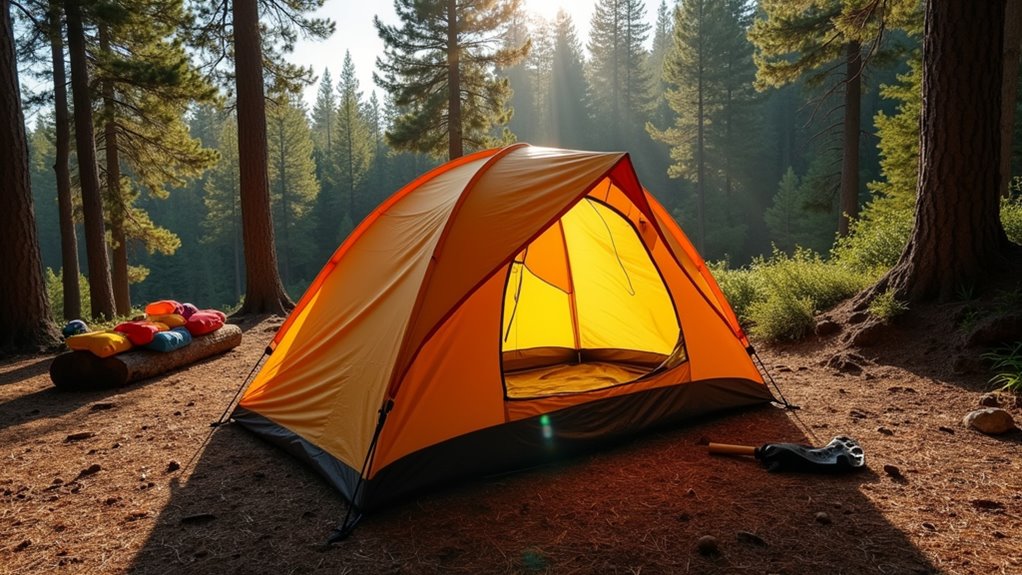
Although tent setup might seem straightforward, proper technique makes the difference between a cozy shelter and a midnight disaster. First, choose level ground away from trees and water sources. Clear rocks, sticks, and debris that’ll poke through your tent floor. Lay out your footprint or tarp, then spread your tent body on top.
Insert poles carefully—forcing them damages both poles and fabric. Most modern tents use color-coded clips or sleeves that make assembly intuitive. Attach the rainfly with the door zippers facing the same direction as your tent’s entrance.
Stake down corners first, then guy-lines. Pull fabric taut but not tight—you need some give for wind. Test your zippers and door before celebrating. You’ve just created your home away from home. Consider joining a camping club to learn advanced techniques and connect with experienced outdoor enthusiasts who can share more setup tips.
With your shelter secure, you can turn your attention to one of camping’s most rewarding skills—creating fire. First, check if fires are permitted and locate designated fire rings.
Gather three sizes of dry wood: tinder (pencil-thin), kindling (thumb-thick), and fuel wood (wrist-thick). Clear a ten-foot radius of flammable debris.
Build your fire structure before lighting. Create a tinder nest, then construct a teepee of kindling around it, leaving gaps for airflow. Light the tinder and gradually add larger pieces as flames grow.
Never leave your fire unattended.
Once established, your campfire becomes the heart of your outdoor experience, where you can create enchanting moments through storytelling, cooking, and connecting with fellow campers.
To extinguish, pour water over flames, stir ashes with a shovel, add more water, and stir again. The ashes should be cool to touch before you leave.
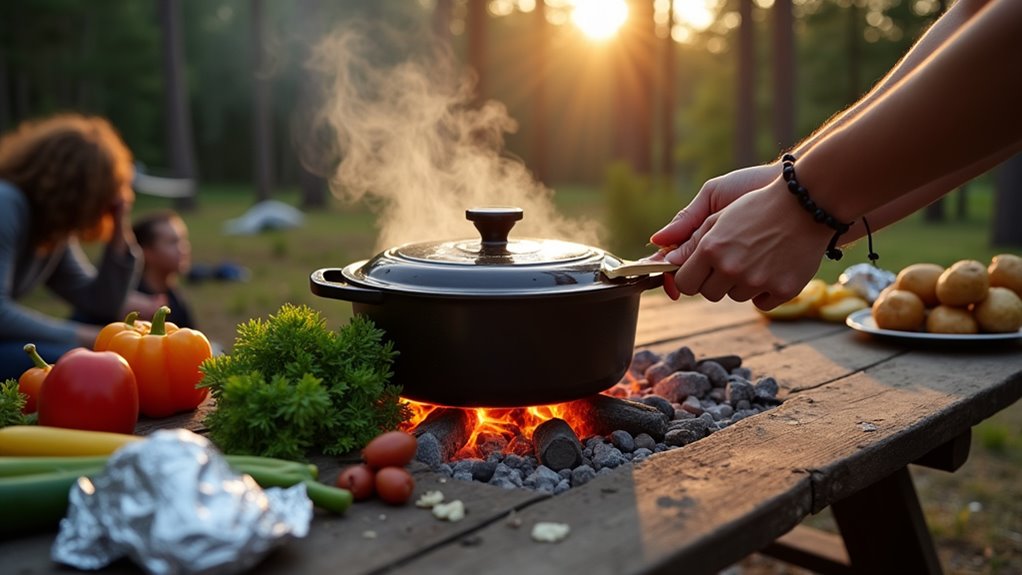
After mastering fire-building, you’ll discover that campfire cooking transforms simple ingredients into memorable meals. Start by planning your menu around foods that cook well over flames—think foil packets, skewers, and one-pot dishes.
Pre-cut vegetables and marinate proteins at home to save time and effort at your campsite.
Pack essential tools: a cast-iron skillet, long-handled utensils, heavy-duty aluminum foil, and a grill grate. Don’t forget salt, pepper, and your favorite seasonings.
Store perishables in a well-iced cooler and keep raw meat separate from other foods.
Build a proper cooking fire with hot coals rather than towering flames. Cook over the coals’ steady heat for even results.
Start with foods requiring longer cooking times, then add quicker items. Soon you’ll be creating delicious outdoor feasts.
For campers who want to expand their cooking capabilities beyond the campfire, camping vans offer built-in kitchens with stoves, refrigeration, and ample prep space for more elaborate meal preparation.
Beyond enjoying delicious campfire meals, your wilderness adventure depends on making smart safety decisions that protect you from potential hazards. Start by informing someone about your camping location and expected return date. Pack a first aid kit and learn basic wilderness first aid before you leave.
Store food properly in bear-proof containers or hang it at least twelve feet high and four feet from tree trunks. Never leave food scraps around your campsite. Keep a clean camp to avoid attracting wildlife.
Carry a whistle, flashlight, and extra batteries. Know how to signal for help if needed. Check weather forecasts regularly and have an evacuation plan. Trust your instincts—if something feels unsafe, change your plans immediately.
Protect yourself from disease-carrying insects by taking precautions against tick bites while exploring trails and setting up camp.
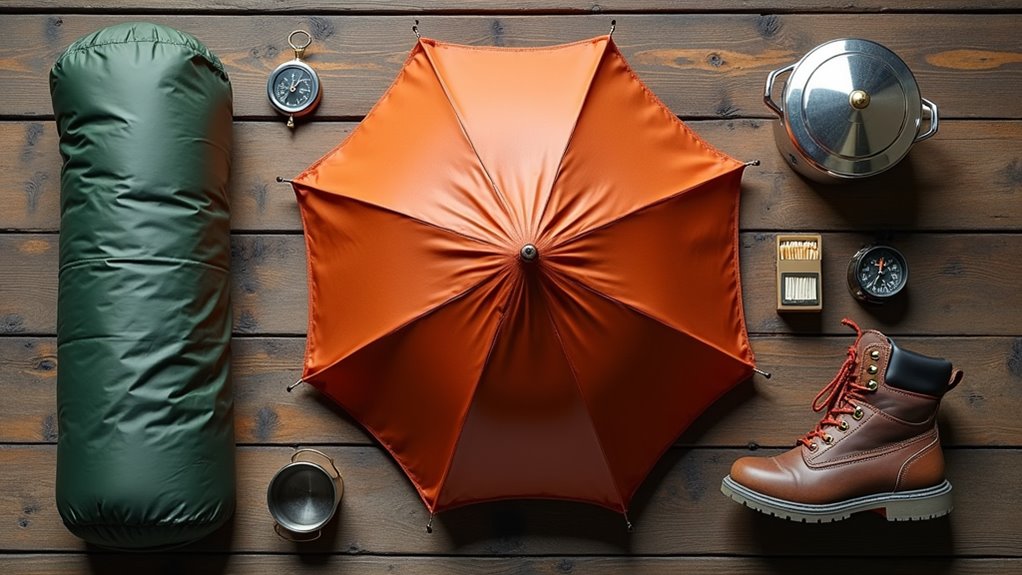
Smart packing can make or break your camping experience, so you’ll want to organize your gear systematically before heading out. Start with shelter essentials: tent, sleeping bag, sleeping pad, and tarp.
Pack weather-appropriate clothing in layers, including rain gear and extra socks. Don’t forget your headlamp, flashlight, and backup batteries.
For cooking, bring a portable stove, fuel, lightweight cookware, and a cooler with ice packs. Pack plenty of water or purification tablets, plus non-perishable foods that won’t spoil.
Include a thorough first aid kit, insect repellent, sunscreen, and personal medications.
Essential tools include a multi-tool, rope, duct tape, and trash bags.
Always pack a detailed map, compass, and whistle for emergencies.
Create a checklist beforehand to avoid forgetting vital items. Don’t forget to pack some family camping activities to keep everyone entertained during downtime at your campsite.
When you’re exploring nature’s backyard, practicing good camping etiquette guarantees everyone can enjoy the wilderness for generations to come. Follow the Leave No Trace principles: plan ahead, camp on durable surfaces like established sites, and pack out all trash—even tiny pieces.
Dispose of waste properly by burying human waste 6-8 inches deep, 200 feet from water sources. Leave natural objects where you find them; don’t move rocks or pick flowers.
Keep campfires small, use existing fire rings, and completely extinguish them. Respect wildlife by storing food securely and observing animals from a distance.
Be considerate of other campers by keeping noise levels down, especially during quiet hours. You’ll preserve nature’s beauty while creating positive experiences for everyone.
If you’re planning a fishing trip during your camping adventure, consider whether renting or buying a used boat makes more sense for your specific needs and frequency of use.
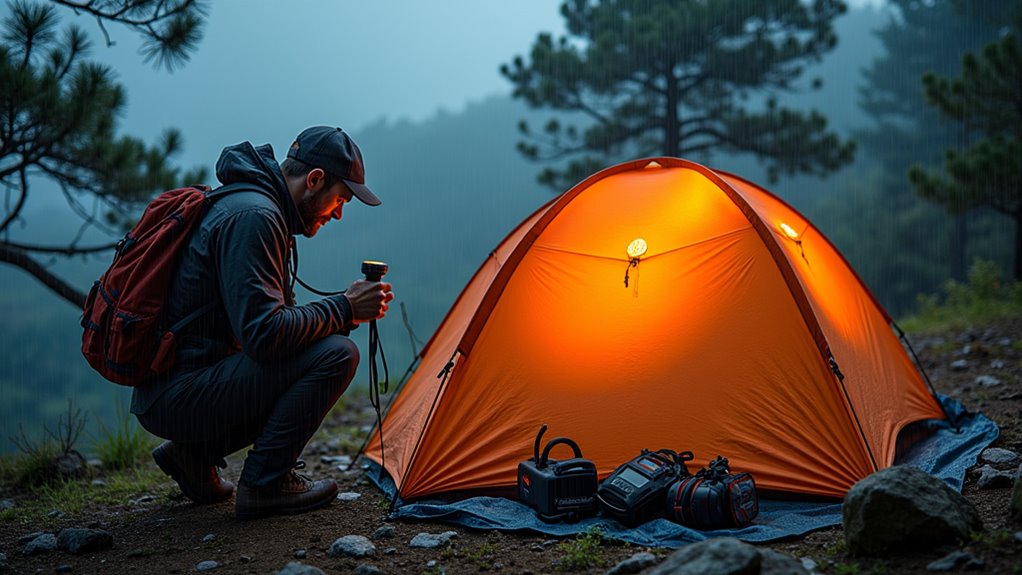
Mother Nature doesn’t always cooperate with your camping plans, so you’ll need solid strategies for handling unexpected weather and emergencies. Always check forecasts before departing and pack accordingly.
For sudden storms, secure loose items and seek sturdy shelter immediately. If your tent’s inadequate, find natural windbreaks or head to your vehicle.
In extreme heat, stay hydrated and seek shade during peak hours. Cold snaps require layering clothes and using proper sleeping gear ratings.
Keep emergency supplies accessible: first aid kit, flashlight, whistle, and extra batteries.
For serious emergencies, stay calm and assess the situation. Signal for help using mirrors, bright clothing, or noise.
Know your location coordinates and nearest emergency services. Always inform someone about your camping plans and expected return time.
In areas with wildlife activity, maintain a clean campsite and store food properly to avoid attracting wild animals to your location.
Beyond simply surviving outdoors, you’ll want to embrace activities that create lasting memories and deepen your connection with nature. Camping offers unique opportunities to disconnect from daily stress and rediscover simple pleasures.
Camping transforms ordinary moments into extraordinary memories while helping you reconnect with nature’s timeless rhythms and forgotten simplicities.
Here are four ways to maximize your outdoor adventure:
Don’t over-schedule your time. Leave room for spontaneous exploration, quiet reflection, and genuine conversations around the campfire. These unplanned moments often become your most treasured memories.
You’ve got the knowledge, gear, and confidence to tackle your first camping adventure. But here’s what separates memorable trips from forgettable ones—it’s not the perfect weather or flawless execution. It’s your willingness to embrace the unexpected moments when things don’t go as planned. Those unscripted experiences? They’ll become your favorite stories. So pack up, head out, and discover what nature’s been waiting to teach you.